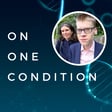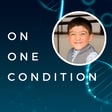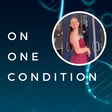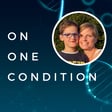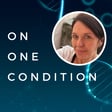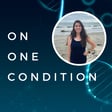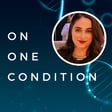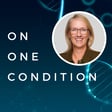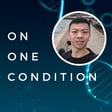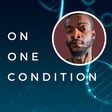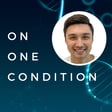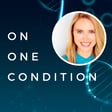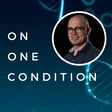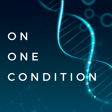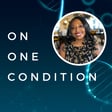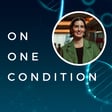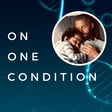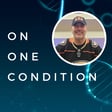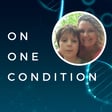Become a Creator today!Start creating today - Share your story with the world!
Start for free
00:00:00
00:00:01

Episode 56: Jenny Jones - Familial Adenomatous Polyposis
Jenny recounts a deeply personal story of struggles, courage and self-discovery, as she looks back on her battle with Familial Adenomatous Polyposis (FAP). A traumatic surgery experience had an extremely negative impact on Jenny's mental health, leading to a childhood marked by medical PTSD and deep depression. Through heartfelt dialogue, Jenny shares her journey of diagnosis, advocacy, and acceptance. She has transformed her struggles into a mission to improve lives through awareness and research.
The song that Jenny selected is Sound of Madness by Shinedown.
Transcript
Introduction and Guest Overview
00:00:00
Speaker
Hi, I'm Sylvain Bertolo, and you're listening to On One Condition, a podcast to raise awareness about health conditions by listening to people who live them every day. My guest to- today is Jenny Jones, and we're going to talk about familial adenimotus polyposis. I hope I pronounced that well. You did. It's a mouthful. the well Thanks, Jenny, for joining me. How are you doing?
00:00:28
Speaker
I'm doing well. Thank you so much for having me. oh It's a pleasure. So as you know, I always ask about a song to start with. So what song did you choose and why? So I think one of my favorite songs is Sound of Madness by Shine Down. It's kind of like a fight song for me it to remind me to to get up and fight for myself. And it it sounds nice and angry and I know it.
00:00:58
Speaker
I'm always an outlier and um angry songs like make me feel happy, like death metal and things like that. I get that. I think it's interesting because no matter what style of music you like, there is like sometimes it's a comfort blanket. So yeah, I figured that. Yeah. You mentioned fights. Is that something you feel like you you're doing on a daily basis?
Living with Familial Adenomatous Polyposis (FAP)
00:01:28
Speaker
Not as much now, but for the majority of my life, I lived in survival mode. And with my ah medical complications, I've had to do a lot of advocacy with doctors and hospitals to get the care that I need. Not so much now. I i have a really good team now, but growing up, it was definitely a fact.
00:01:53
Speaker
Wow, okay. I'm sure we'll talk more about that. So we're talking about FAP today. Could you tell us when it started affecting you, when you were aware that you have this condition? Yeah. So my parents and knew that there was a chance that I had it because my mother had it. So they knew that I'm like I could have inherited it, but it wasn't officially diagnosed until I was about eight. I started having a lot of stomach pains when I was about seven. And as it turned out, that actually wasn't related to the FAP. But it was what helped lead to me getting diagnosed because and when I finally got to a GI doctor, she did a full
00:02:44
Speaker
check up with testing and and everything and to find out why I was having stomach pain and do I have a baby. Okay. And the stomach pains were not related, you said? No, it was actually they were and stress induced. And so I was starting to develop ulcers and that's what was causing my pain was and the ulcers that were starting. Yes, that doesn't sound nice. ah So you said that your mum has it um and so it's hereditary then?
00:03:20
Speaker
Yes. And now it can have a spontaneous mutation, and but primarily most people ah inherit it from one of their parents. And so with my family, we had a long line of FAP. Okay. From your point of view, did it make it easier to know how to deal with it because of your family history? It did. Now,
00:03:49
Speaker
Well, because my mother, um she was a very great advocate for me. So she taught me how to advocate. She modeled for me, not that I ah did it well, especially as a child, because I had a lot of coping issues with everything. So she was very good about, even though she didn't want to undergo different tests or procedures and things like that,
00:04:16
Speaker
she always handled it with so much grace and dignity and and and not to say that if you have trouble dealing with those things like I do that it's not still that you don't have dignity to still but there's a lot of things that I don't handle well medically as well as my mom but she always modeled it for me and I do my best with it.
00:04:39
Speaker
Yeah, yeah. It must be difficult growing up, like watching your your mum knowing that that's going to affect you. How did it impact your childhood? Well, so then because my mom had FAP and so did her dad. and I was very close to my grandpa and they both had ostomies. So I learned from them like how you know how to handle with an ostomy and cope with it and kind of what what you know can happen with FAP. Again, not that I handled it well as a child because ah my I had a lot of medical complications my first year.
00:05:23
Speaker
And so I developed medical PTSD. I was very angry and depressed. And it was helpful to have them as support and the knowledge that they had. But I also, because I was so angry, didn't always let them help me. Like I should have.
00:05:44
Speaker
I think we'll come back to what you just described. Before we go there, would you be able to tell us how does FAP affect you? What kind of symptoms you have?
Medical Journey and Challenges
00:05:58
Speaker
so i So when I was nine, I had to have my colon removed because I had colon polyps from FAP that were starting to turn cancerous.
00:06:08
Speaker
And I had complications ah that required part of my small intestine removed ah two weeks later. And ah so I lived with an ileostomy for six years due to those complications. And then when I was in high school at 15, I had it reversed. So I undergo, as part of my surveillance, I undergo a upper and lower scope, ah So an EGD and that what's considered a colonoscopy, even though I don't have a colon every year or two, just to monitor for more FAP polyps. I had my gallbladder removed in 2021. And while it wasn't it wasn't known that it was also related to FAP until I had it removed and they found an FAP polyp,
00:07:03
Speaker
in it and FAP polyps are precancerous. So they will eventually turn to cancer. But I also have a yearly thyroid ultrasound because we have a higher risk for thyroid cancer. So I have a lot of, and we have several different cancers we're at higher risk for, it but so I have a lot of monitoring that I have to go through. And due to the ah colon and part of my small intestine removal, I have short bowel syndrome.
00:07:33
Speaker
which is another rare disease. And so that causes kind of as a, with colon removal anyways, we tend to have nutrient deficiencies and chronic dehydration, but it's even worse into a short bowel syndrome. So I get iron infusions every three months and I have several different medicines I have to take to try to keep all my labs in range. And from my chronic dehydration, I have developed cysts on my kidneys.
00:08:03
Speaker
and But they're they're stable. but So every now and then I have monitoring for that by a kidney doctor. So wow so so many different things. I know. So just going back to f FAP itself, so if I understand correctly, it leads to polyps in various parts of your digestive system.
00:08:28
Speaker
It yeah mainly, I mean, it it does do a lot in the digestive system, but they can develop outside of the digestive system too, which is an even more worrisome thing at at times. mean I try not to let any of it worry me. i I've accepted, you know, the risks of FAP, but I know a lot of people, it it's very concerning for them and understandably so.
00:08:52
Speaker
Yeah. ah But then you also mentioned chronic dehydration. Is that linked to f FAP? Well, it's kind of like a side effect of it from the colon removal. Okay. Okay. And and your colon removal was when you were nine.
00:09:13
Speaker
um Was it because of the risk of cancer at that time? Yes. yeah they um I don't remember how many polyps I had, but they were starting to turn cancerous. So um it was it was definitely needed and that at that young age.
00:09:32
Speaker
And for people who don't know, would you be able to explain what the polyp is? Sure. It's an abnormal growth and polyps can, in general, they can develop anywhere in the body. but And some of them are pre-cancerous to begin with, like FAP. And then some are very low risk of ever becoming cancerous. There's different categories of them, but they're an abnormal growth.
00:10:00
Speaker
Yeah. If someone like me who doesn't have a FAP was to have a polyp, I can imagine they can generate a lot of anxiety because of the risk of it becoming cancerous. So from from for you then, is it something that you're used to now? And do you still have this worry or not?
00:10:26
Speaker
I'm used to it and I don't really worry about it. But again, I'm an outlier. and i Because I had near-death experiences and with my medical PTSD, I look at life very different from most people. And so I'm not afraid to die. i've With my last near-death experience, I experienced a deep sense of peace that I don't think is found on earth. And so I'm okay with whenever it's my time. I still do, you know, my tests and procedures and things to try to keep myself as healthy as I can be. But I don't really worry about it. My worry is the pain that's going to be involved with a test or a procedure. Not so much the
00:11:20
Speaker
ah risk of ah death at some point. It's all that quality of life for me. so Okay. What was your last near-death experience caused by? it was It was caused by short bowel syndrome, really. and It was after I had my ileostomy reversal.
00:11:42
Speaker
and right well It was a combination of short bowel syndrome and I had so much scar tissue from all my previous surgeries that it caused a stricture around my small intestine. And so I was massive amounts ah for both directions for, you know, months. And and with the short bowel syndrome, it was already, I don't absorb well to begin with.
00:12:09
Speaker
So it just made it worse and my electrolytes, my lab values were all dangerously low. And so I was and i was at risk of death pretty much every day for, I mean, definitely at the highest risk was at a year, but I struggled with it for a good five years before it finally stabilized. Wow. That must be um must be difficult.
00:12:40
Speaker
It was because I had to, I had to go in the hospital a lot during that time, especially that first year I was in and out very frequently. I had to see my doctor every week and get labs every week and wow because they were so low. yeah And that was, you know, in addition to her trying to treat them and to get them to stay up. Yeah.
00:13:06
Speaker
So you talked about the fact that with short bowel syndrome, you ah you don't assimilate food as as well as other people do. ah So do you have to follow a specific diet? i Some people do. Some people require artificial nutrition, such as TPN.
00:13:31
Speaker
And I did for about six months during that time when I was ah so dangerously low on everything. But I don't really particularly follow a particular diet now. I do try to get enough potassium in my diet because my kidney doctor doesn't want me to take potassium medicine if I can help it.
00:13:53
Speaker
I have a lot of different medications and supplements and things that I have to take to help with the short bowel syndrome. But I generally eat what I want to, though. I've definitely had specific diets in the past I've had to do, but yeah but not now so much. And why does your GP not want you to take potassium supplements?
00:14:15
Speaker
Well, cause it's, it's really close to normal. So she thinks I can get enough of it by diet. yeah And there is a ah hydration drink here in the U S that it has a lot of potassium. So if, if I drink that on a consistent basis enough, then I do keep my potassium within range.
00:14:38
Speaker
Okay. So I'd like to go back to medical PTSD. You mentioned that you suffered from that. First of all, would you be able to share where it came from and then maybe how it affected you?
Mental Health and Coping Strategies
00:14:57
Speaker
Absolutely. So the first where where the first place that stemmed was two weeks after my initial surgery to remove my colon,
00:15:08
Speaker
my incision became infected and so by two weeks it was pretty healed up and so they took me to the ER and they kept me in the ER. They did give me a shot of morphine however morphine is not an effective pain medication for me and so they then proceeded to cut my incision open and clean it out and then sew it back up while I was awake. whoa It was the worst pain I have ever experienced in my entire life. And that was where it started. And then having repeated surgeries and tests and print and and procedures that were painful, just complicated it.
00:16:01
Speaker
yeah ah how so How did it then affect you moving forward? I have ah for a lot of my life lived still as that nine-year-old girl. and I was 10 when they and I a second surgery because they cut me open and it wasn't um you know just a superficial cut because it was closed up. But I was technically 10 at that time, just newly. yeah But um I was so angry from everything that had happened that year. I was angry because I wasn't supposed to have an ileostomy that was considered permanent. It was supposed to be only there for three months. I had all these complications. My first surgeon was terrible.
00:16:55
Speaker
I didn't trust the children's hospital that I was at. And so I i became suicidal. I was homicidal toward the people that I blame for all these things. And I lived like that for about five years until I went to counseling when I was 14. And so i I didn't cope and I didn't talk to anyone. I didn't feel safe to talk to anyone because i I didn't, and I blamed my parents because they had me. I wrongly blamed them, but so I didn't want to talk to them. I blamed my GI doctor because she was the one, you know, taking care of me. I, so I didn't want to talk to her and I was terrified to let anybody that I knew outside of my family know
00:17:53
Speaker
anything about my health. So I didn't talk to anybody. So I was a very angry, hateful child and depressed child that just, but once I started counseling, I started to learn coping skills, like healthy ones. And I forgave my parents and my, my doctor. And I started on the road to healing and I do much better with it now.
00:18:22
Speaker
although there's times definitely I revert right back to that nine year old little girl.
00:18:29
Speaker
Did it affect friendships as well? like how Because it's a known visible illness or chronic disease that's affected you very deeply as as I can hear. so night yeah were Were you able to to hide it from friends as well or did you feel like you had to hide it? I felt like I had to hide it because I couldn't accept myself. So I didn't think anyone else would, except for my family. And so I didn't get very close to a lot of people. But once I started letting my friends know, like now I pretty much anybody that knows me, if they want to know about something, I don't, I'm not shy to let them know. And so, but so now I have a lot deeper friendships because
00:19:28
Speaker
the people that I'm surrounded by accept me for who I am, most of them do. ah Some people, they really struggle with accepting someone's mental health in general, even if it's not related to their physical health. But I do have people that who don't understand how I really struggled with suicidal ideation and how I still struggle with sometimes I just don't want to be here anymore. And not that I'm at risk of hurting myself, but some people, they don't have empathy for that. And so they can be very insulting and in cruel, even though you thought they they were they were your friend. Yeah, it's hard. ah That's something I've come to realize through doing the podcast that
00:20:24
Speaker
Even if you explain as much as you can, I think sometimes people have to live things themselves or experience things themselves to actually understand.
00:20:36
Speaker
and then empathize. no And obviously, not everyone can experience everything. But I can imagine that it must be very hard to to connect with with people if they don't really if they're not ready to to understand right your situation.
00:20:56
Speaker
Absolutely. or this The willingness to, because some people they're not willing to, and you know that can be all for different reasons, but like my partner, he doesn't understand any of it because he doesn't really experience anything like it. He does have some chronic pain at times, but he doesn't. So he's very empathetic though, but I have to break it down for him to understand what I'm experiencing. And then he's like, oh, okay, i i can I can get a better grasp on that now so I can better understand what you're going through and things. Could you tell us a bit more about counseling? so
00:21:41
Speaker
It sounds like it was very, very tough for you growing up. um So how did counseling get you to where you are now, where you're i mean openly sharing with the world? so it Well, not only did counseling help me start to learn healthier coping skills, so because i mean even in general, when I would go in just for IVs, I had to be restrained. I was screaming and crying.
00:22:09
Speaker
And now I don't scream. I may cry, especially after the sixth attempt. I pretty much am crying by then. but But I have so much, um, I respond more and instead of reacting to things I, um,
00:22:29
Speaker
it It gave me a place to process where I felt safe to talk about it and start processing my trauma. And I've continued counseling over the years. I'm in a trauma therapy now that I've been in for getting closer to three years now. It's called EMDR. And that's been very helpful too. It really helps to bring the disturbance level down on traumatic ah experiences that happened in the past. And even you can do a future template of disturbing things that may be traumatic for you that might happen in the future so that you can better prepare for it and your brain is able to properly process events.
00:23:19
Speaker
And that's been very helpful. i It's one of my biggest fears in life and it's it's still a big fear of mine. I lost my mom. I'm terrified of losing my dad. But i I entered into the EMDR about three years ago because I knew I was like, I have to get more healing done because I was so terrified of losing my parents that I wasn't sure how I would live without them. I i don't
00:23:51
Speaker
know what I would do. you know i I don't know what I would have done. I knew I wouldn't handle it well at all. And I was afraid that I wouldn't be able to even just function. and so But with EMDR and working through those traumas and things, I'm still here. Even though I lost my mom, we're getting closer to to six months ago. Well, I don't want to lose my dad and I'm scared of it.
00:24:20
Speaker
i' am not I know that I can continue on living and not just existing either. I know I can live and thrive. And and that's that's ah it's as' a huge example of just how powerful counseling and yeah and can be. I'm really sorry to hear about your mom. Was it linked to f FAP?
00:24:50
Speaker
it was it wasn't the It was listed as an underlying cause on her death certificate, so it was a third, and but it was definitely related to FAP.
00:25:03
Speaker
yeah I'd like to switch topics slightly because you you mentioned when we were preparing that you ah started a research
Advocacy and Research Efforts
00:25:16
Speaker
fund. So would you be able to tell us a bit more about that? Yes. So right now the treatments really for FAP are just trying to delay surgery. So it's not very preventative. It's just really trying to delay it.
00:25:33
Speaker
and And by delaying, it's I mean trying to delay surgery for FAP. So in 2015, I partnered with the National Organization for Rare Disorders, and ah which is a US-based company that they are incredible. They ah they do so much for the rare disease community, um education, advocacy, awareness. So I partnered with them ah to create a research fund for FAP, and so I'm still working on funding it. I still have a ways to go, but once it's fully funded, then a researcher can apply to receive that fund as a grant to do research on FAP. And my my hope, what I want for FAP research is that we move beyond delaying surgery to preventing it.
00:26:30
Speaker
And I do think it's possible that one day we will get there. and But by being able to to get more research funded, I'm hoping that we'll get there faster. Yeah, yeah. And I'm with you that I think everything's possible in medicine. So and that's great that you've started that. How much do you need to raise?
00:26:58
Speaker
I need about 40,000 more ah dollars. and it's When I started it, it was now i have about I think we have about close to 5,000, 6,000 maybe in there. I can't remember exactly.
00:27:16
Speaker
but especially with inflation and things. So that was back, you know, it was almost 10 years ago I started that. and They set the the goal on the campaign page at $40,000. And so we still we still have a quite a bit to go. Yeah. And what do you do then to fund, to to raise money? So I have, I created a shop, an online shop that I have different all It has all kinds of different ah products and I have several different designs. ah Some are FAP related, some are just chronic illness, some are just, I have like one mental health one.
00:27:54
Speaker
um But there are all kinds of different products. I donate all of the profits I receive from that to the fund. I wrote a children's book about FAP and I donate a portion of those funds, ah profits to the fund. And we have open campaigns so people can create a team on the fundraising campaign and ah Do like kind of do their own fundraising for it. It's open to anybody and everybody it was very Nice a lot of people donated to the fund in honor or memory of my mom which was so touching and so it's and that's kind of one of the things like I and Do in her memory is is in memory of mom if you'll donate to that
00:28:49
Speaker
we put that even as you know in lieu of flowers like donate to that place. Nice. I find that incredible that you're you're doing this and I'm so so grateful for people like you who will do something that's very ah selfless to help future generations.
00:29:18
Speaker
um So we'll put a a link on on the website so that people can find a the fundraiser if they want to donate. Yeah, I appreciate that.
00:29:32
Speaker
And so the the organization you're working with is Nord, is that right? Yes. yeah ah So how did you work with them? Like how, what kind of support do they provide?
00:29:47
Speaker
oh Nord is just incredible with me. They um like not only do they kind of like every now and then we'll have meetings like um Okay, what? What would be helpful for for getting more funding for the for the FEP research fund? What would I highlight like to see or what what suggestions that they have for me? They they have posted a I did a ah an article on ah For them that they asked me to do or they included us on a website they in in memory of mom They made a tribute to mom on their social media ah they are just so kind and and I just They're they're great for if if you have questions if you have they have all kinds of resources for rid disease patients. They're just a
00:30:38
Speaker
very kind people. yeah They just really get it. Yeah, I've come across what they do a lot of time now and it's really like the reach they have and the level of support they provide is incredible. Well, that's very, very good to hear. I'm really hopeful that you're going to get to your goal um very quickly.
00:31:06
Speaker
I hope so. I have a backup plan though. i put I have in my will that whenever I do pass on that I use some of my ah life insurance policies to get that funded. So at one point it will be. yeah if not and If not now, then at one point. Well, let's let's think that it's going to happen without yeah without needing your life insurance. yeah Well, ah I've learned a lot today. and Thank you. like It's been very interesting and and thank you for sharing about your your struggles as well with mental health, PTSD, because I think it's important for people to hear and that others go through that and that you can you can overcome those challenges.
00:32:03
Speaker
Absolutely. Rare disease is so isolating to begin with. And then when you add mental health on top of it, it can feel even more isolating. And that's really that what drives me is that I just don't want people to experience the medical and the mental health experiences that I have.
00:32:25
Speaker
yeah So I love asking the same question to finish to everyone.
Reflection and Finding Joy
00:32:31
Speaker
What's your happy place? The place where you feel at peace? Oh, that's when it's easy. It's my parents' home. Oh, nice. Yeah, that's my happy place. Any anywhere in particular? It's sometimes it's outside. It's ah my parents have an acreage and it's really pretty. Mom,
00:32:54
Speaker
ah She even cultivated Wildflowers to grow just like all over the front yard and in the ditches and they're beautiful and she has all these sprawling and Flower beds that were never properly maintained because they're so big and ah So it's just beautiful there and it's peaceful and it's quiet and then sometimes it's inside the house because it's that's home and Yeah. wow Sounds nice. So I take notes when we go through those discussions. And when you when we started, you mentioned sound of madness.
00:33:40
Speaker
hu as a fight song. And then you talked about your battle, which is pretty much ongoing. um But I feel like you've turned ah maybe what was ah an inner battle into an extroverted battle in a way, trying to to get phones to get research going. And I think that's incredible.
00:34:09
Speaker
And I would cry. I think so, too. It's and I definitely. I don't feel like I'm in survival mode so much. I I get to experience joy now, which is something I didn't experience until maybe two years ago, really. But yeah, so I don't I don't feel like I have to fight for me so much. And I'm getting back to where I can ah fight for people again after losing mom.
00:34:40
Speaker
but it definitely, I shifted from I have to fight for me to I can fight for other people. Yeah. Well, I do wish you many more joyful years to come. Thank you. It's been a ah pleasure. Thank you very much. Thank you. I've enjoyed it.
